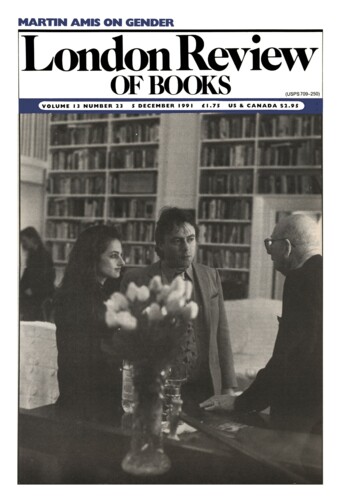A.D. Nuttall
A.D. Nuttall’s books include Two Concepts of Allegory, A New Mimesis, Shakespeare the Thinker and Dead From the Waist Down, a study of the idea of the scholar in relation to sexuality. For many years a fellow of New College, Oxford, he died in January 2007.
The Game of Death
A.D. Nuttall, 11 June 1992
Why do we enjoy tragedy? It may be thought that our best hope of answering this question lies in the psychology of Freud, who disclosed the dark side of the psyche. Behind this darkening of the mind, however, there lies another darkening, of our picture of the ancient sources European literature. Antiquity, formerly given over to the Ego, becomes the province of the Id. Roughly speaking, a sunlit, rational, enlightened world – peopled as it were by marble figures in a state of tranquil felicity (think of Winckelmann) – was replaced, retrospectively, by an opposite world: blood guilt and sacrifice, dream and vision, orgiastic music, unreason. One way of expressing this change is to say that the pretence of Augustianism was dropped: instead of assuming that antiquity was somehow full of 18th-century rationalists having either no religion or a religion etiolated and simplified to the point of minimal Deism, it was at last noticed that the ancient world pullulates with spirits and deities, is crammed with unreasonable, alarming powers. This, by the way, is simply true.
Return of the real
A.D. Nuttall, 23 April 1992
The idea has got around – among ‘advanced’ thinkers of various political persuasions – that realist epistemologies are a thing of the past, that truth values in criticism have now been discredited (or shown up as just a figment of bourgeois ideology); that history and politics are textual ( = fictive) phenomena on a par with poems, novels, or whatever other ‘kinds of writing’ you care to name; and that henceforth the only ‘discourse’ that counts is one that cheerfully acknowledges all this, along with such assumed faits accomplis as the ‘deconstruction’ of the humanist subject as a locus of ethical choices, conflicts and responsibilities.’
Did Socrates say it?
5 December 1991
Point of Wonder
A.D. Nuttall, 5 December 1991
‘Greece, having been subjected, subjected her wild conqueror and introduced culture into boorish Rome.’ The poet Horace, himself a Roman, can take a stylish pleasure in describing the Roman conquest of Greece, even though – or rather because – it piquantly entails the intellectual and artistic near-humiliation of the conqueror. Rome is notorious for its brutality, but it was not so brutal that it could not see that, when confronted by the poetry and sculpture of Greece, it must fall to its knees. The paradox of a conquest of iron mirrored and almost eclipsed by a converse conquest of discourse is deliciously Greenblattian. But in Marvellous Possessions Stephen Greenblatt is dealing with the Spanish conquest of the New World. This time the conqueror’s assurance of superiority is brutally uniform: a superiority of arms, together with a superiority of spirit, consisting in the possession of the True faith, produce an inertly predictable result.’
Pieces about A.D. Nuttall in the LRB
O How Unlike the Father: Bad Father, Good Son
Frank Kermode, 15 October 1998
A.D. Nuttall is probably the most philosophically-minded of modern literary critics, and he has the additional merit of assuming that at some level philosophical (or theological) problems are...
Getting Even
Adam Phillips, 19 September 1996
We wouldn’t think of anything as a tragedy if we did not have a deeply ingrained sense of order already there to be affronted. Tragedy in life, and as art, exposes by violation our mostly...
Making a start
Frank Kermode, 11 June 1992
A.D. Nuttall is among the most erudite contemporary academic literary critics, at ease with the Classics, much given to philosophy. He is also disconcertingly bold and curious, and his latest...
Talk about doing
Frank Kermode, 26 October 1989
Anyone presuming to review works of modern literary theory must expect to be depressed by an encounter with large quantities of deformed prose. The great ones began it, and aspiring theorists...
Talking about Shakespeare
Frank Kermode, 28 September 1989
Barbara Everett’s book consists of her four Northcliffe Lectures, given at University College London in 1988, on Hamlet and the other ‘major’ tragedies, together with a number...
Tibbles
Barbara Everett, 17 October 1985
Even Swift, who liked to think he was half author of the Dunciad, had trouble with its allusions and wrote grumblingly to warn Pope that twenty miles from London ‘nobody understands hints,...
Transparent Criticism
Anne Barton, 21 June 1984
Erich Auerbach’s celebrated study of the representation of reality in Western literature, Mimesis, was published in German in 1946. Grounded on the analysis (mainly syntactic) of passages...
Dear God
Claude Rawson, 4 December 1980
‘Imagine – if you can – God reading this poem.’ So begins this brief, stylish book, citing Herbert’s ‘Dialogue’ (‘Sweetest Saviour, of my soul...
Read anywhere with the London Review of Books app, available now from the App Store for Apple devices, Google Play for Android devices and Amazon for your Kindle Fire.
Sign up to our newsletter
For highlights from the latest issue, our archive and the blog, as well as news, events and exclusive promotions.



